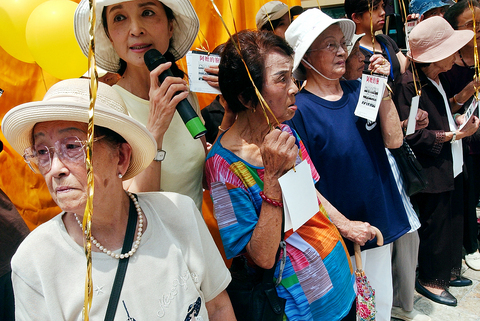Asia commemorated the 60th anniversary of Japan's World War II surrender yesterday by honoring the dead and searching for reconciliation, while Japan's leader tried to salve wounds by apologizing for the "great damages and pain" it inflicted on its neighbors.
With ceremonies and protests, the region memorialized the end to a conflict that killed millions of soldiers and civilians from the jungles of Burma to the glistening beaches of the Pacific and the sprawling cities of Japan and Korea.
Anger mixed with sorrow amid rekindled tension between Tokyo and the countries its Imperial Army invaded decades ago.

PHOTO: AP
Japanese Prime Minister Junichiro Koizumi expressed "deep reflections and heartfelt apology" for Tokyo's wartime colonization and pledged that his country would never forget the "terrible lessons" of the war, which ended Aug. 15, 1945.
"Our country has caused great damage and pain to people in many countries, especially our Asian neighbors, through colonization and invasion," Koizumi said in a statement. At a ceremony shortly thereafter, Koizumi and Emperor Akihito -- son of wartime Emperor Hirohito -- bowed before an alter of chrysanthemums at a nationally televised service for the nation's estimated 3 million war dead.
Japan's relations with some of its Asian neighbors are at the lowest point in years in part because of disputes about whether Japan has properly atoned for its past aggressions. The issue has contributed to opposition to Tokyo's bid for a permanent UN Security Council seat.
Fueling the grievances are Koizumi's controversial visits to Tokyo's Yasukuni shrine and his government's approval of history textbooks that critics say whitewash wartime atrocities such as the Rape of Nanking, in which Japanese troops massacred as many as 300,000 people while taking the Chinese city in 1937.
Tensions have also been stoked by disputes between Tokyo, Beijing, Taipei and Seoul over resource-rich islands off their coasts, and Japan's running argument with China over gas drilling in a contested area of the East China Sea. Concerns over communist North Korea's nuclear weapons program have also increased regional friction.
Protesters in Hong Kong, which Japan occupied from 1941-1945, marched on Tokyo's consulate yesterday, saying Japan had not sufficiently atoned for military aggression and chanting "Japan's hands are full of fresh blood." Scores of police meanwhile guarded Japan's Beijing embassy as China marked the anniversary demanding that Japanese leaders face up to suffering inflicted by their nation.
"Only with an honest attitude towards history can a nation win reconciliation and then integrate into the global community," the China Daily newspaper said. State television devoted the first 10 minutes of its midday news yesterday to war commemorations, showing battle scenes and the bodies of Chinese killed by Japanese troops.

The CIA has a message for Chinese government officials worried about their place in Chinese President Xi Jinping’s (習近平) government: Come work with us. The agency released two Mandarin-language videos on social media on Thursday inviting disgruntled officials to contact the CIA. The recruitment videos posted on YouTube and X racked up more than 5 million views combined in their first day. The outreach comes as CIA Director John Ratcliffe has vowed to boost the agency’s use of intelligence from human sources and its focus on China, which has recently targeted US officials with its own espionage operations. The videos are “aimed at

STEADFAST FRIEND: The bills encourage increased Taiwan-US engagement and address China’s distortion of UN Resolution 2758 to isolate Taiwan internationally The Presidential Office yesterday thanked the US House of Representatives for unanimously passing two Taiwan-related bills highlighting its solid support for Taiwan’s democracy and global participation, and for deepening bilateral relations. One of the bills, the Taiwan Assurance Implementation Act, requires the US Department of State to periodically review its guidelines for engagement with Taiwan, and report to the US Congress on the guidelines and plans to lift self-imposed limitations on US-Taiwan engagement. The other bill is the Taiwan International Solidarity Act, which clarifies that UN Resolution 2758 does not address the issue of the representation of Taiwan or its people in

US Indo-Pacific Commander Admiral Samuel Paparo on Friday expressed concern over the rate at which China is diversifying its military exercises, the Financial Times (FT) reported on Saturday. “The rates of change on the depth and breadth of their exercises is the one non-linear effect that I’ve seen in the last year that wakes me up at night or keeps me up at night,” Paparo was quoted by FT as saying while attending the annual Sedona Forum at the McCain Institute in Arizona. Paparo also expressed concern over the speed with which China was expanding its military. While the US

SHIFT: Taiwan’s better-than-expected first-quarter GDP and signs of weakness in the US have driven global capital back to emerging markets, the central bank head said The central bank yesterday blamed market speculation for the steep rise in the local currency, and urged exporters and financial institutions to stay calm and stop panic sell-offs to avoid hurting their own profitability. The nation’s top monetary policymaker said that it would step in, if necessary, to maintain order and stability in the foreign exchange market. The remarks came as the NT dollar yesterday closed up NT$0.919 to NT$30.145 against the US dollar in Taipei trading, after rising as high as NT$29.59 in intraday trading. The local currency has surged 5.85 percent against the greenback over the past two sessions, central